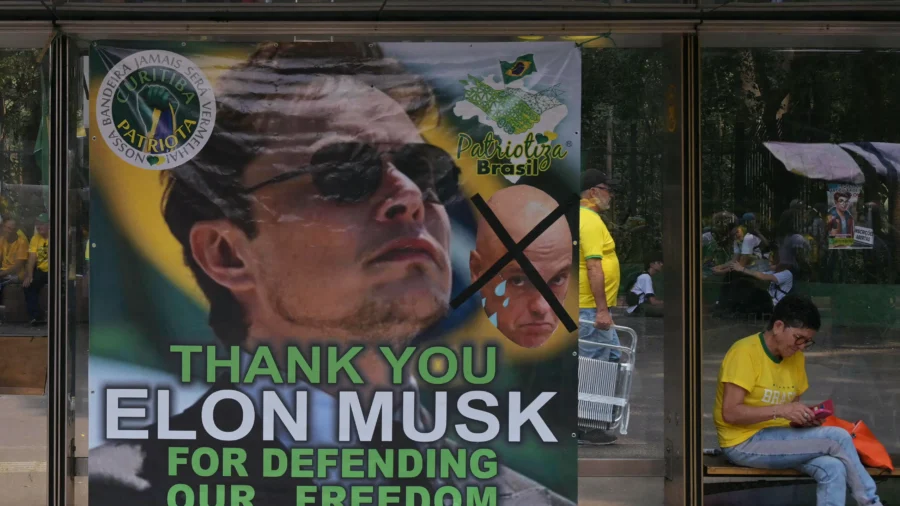Elon Musk’s X has named a legal representative in Brazil, according to the firm’s lawyers, complying with one of the original orders made by the Supreme Court in the process that led to the shutdown of the platform.
On Saturday Andre Zonaro and Sergio Rosenthal, who were recently appointed as X’s lawyers in Brazil, told Reuters that their colleague Rachel de Oliveira Conceicao was chosen as the firm’s legal representative and that they had submitted her name to the Supreme Court.
On Thursday, the lawyers representing X in Brazil said the firm was starting to comply with orders on removing content, another demand from the top court. The Epoch Times has not been able to independently verify this claim and has contacted X and Brazil’s Supreme Court for comment.
The legal move would address demands imposed by Brazil’s top court to allow the company to operate after it was banned in the country.
Block Access
Last month, Brazil’s Supreme Court Justice Alexandre de Moraes ordered all telecom providers in the country to block access to X, escalating a months-long dispute between X owner Elon Musk and the Latin American country over free speech and posts that the judge described as misinformation.
In August, X shut down operations in Brazil, saying that Brazilian authorities had threatened the company’s legal representative with imprisonment for failing to comply with what X described as “censorship orders.”
Earlier this year, de Moraes ordered X to block certain accounts, as he investigated so-called digital militias accused of spreading fake news and hate messages during the government of former President Jair Bolsonaro.
The inquiry—backed by the current leftist government of Lula—came after the Tesla CEO challenged a court order requiring the removal of certain accounts on X as part of alleged efforts to crack down on fake news and misinformation in Brazil.
The five-year investigation, overseen by de Moraes, appointed as a justice of the STF in 2017 by then-President Michel Temer, blamed the accounts for inciting demonstrations across the country after Bolsonaro’s 2022 loss.
De Moraes has authorized adding Bolsonaro to an investigation into who incited a crowd of protesters to break through security blockades and breach the buildings of Brazil’s Congress, Supreme Court, and the presidential palace in Brasília on Jan. 8, 2023.
Forced by Court Decisions to Block Claims
X claims it had been forced by court decisions to block “certain popular accounts in Brazil” and was prohibited from disclosing the targeted accounts. On August 13, it shared a document with the accounts.
“This letter demands censorship of popular Brazilian accounts, including a pastor, a current Parliamentarian, and the wife of a former Parliamentarian. We believe the Brazilian people should know what is being asked of us,” X’s Global Government Affairs account wrote in a statement.

Free speech and privacy activists have warned that Brazil’s enforcement of its ban on social media platform X, through fines for using VPNs, defines a potential battleground between internet freedom and regulation.
Since the introduction of the penalty, equal to nearly a year’s salary for the average middle-class Brazilian, there has been a documented decrease in attempts to access X.
While some Brazilian congressmen have continued using X despite the ban, it is not known whether they are using VPNs.
Others, such as the country’s National Association of Journalists, expressed concerns on Facebook that reporters no longer have access to news reports from various sources, both inside and outside Brazil.
‘Draconian Orders’
X is banned in countries with severe human rights restrictions, such as China, Russia, North Korea, Turkmenistan, Myanmar, Iran, and Pakistan.
On Sept. 12, in an open letter to the Brazilian congress by ADF International, more than 100 international free speech advocates, including former British Prime Minister Liz Truss and “Twitter Files” journalist Michael Shellenberger, said that if Brazil is allowed to continue “in this authoritarian vein” other countries across the West “could likely follow in its footsteps, imposing draconian orders to silence speech and banning digital meeting places.”
“Heavy-handed government censors will use whatever tool at their disposal to chill speech—and as Brazil shows us that includes fining people for using VPNs to access disfavored platforms,” ADF’s senior vice president of corporate engagement, Jeremy Tedesco, told The Epoch Times by email.
Reuters contributed to this report.
From The Epoch Times

